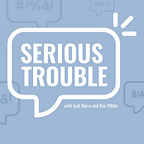Dear listeners,
It’s Wednesday, and the jury in Donald Trump’s Manhattan criminal trial has had his case for about half a day. Closing arguments in the case were Tuesday — prosecutors dryly laid out the facts of the case they had presented, while Trump’s attorney Todd Blanche employed the “cockroach in the spaghetti” strategy, arguing the government’s case relied on claims and observations from Michael Cohen, whom a reasonable person would not trust. Indeed, Blanche deemed Cohen the G.L.O.A.T. — the “Greatest Liar of All Time” — a phrase that I honestly think overstates how great Cohen is at lying.
On Wednesday morning, Judge Juan Merchan instructed the jury on the law — a long and boring process that Ken says jurors often basically ignore — and sent them out to deliberate. And now we wait.
Waiting has also been a theme in the federal criminal case before Judge Aileen Cannon in Florida, as The New York Times notes in a new profile of her handling of that case. As we wait for her to rule on many pre-trial subjects, she has denied prosecutors’ request to impose restrictions on how Trump may talk about the FBI as part of his conditions of pre-trial release. The government’s request here was aggressive — and, if granted, the order probably would have set off a new and distracting round of First Amendment litigation — and issued in a peremptory manner that can be typical for federal prosecutors. Cannon bristled at government lawyers’ failure to meaningfully “meet and confer” with defense counsel over the motion, and that bristling was one of the less-atypical aspects of her judging.
Rudy Giuliani has agreed to stop lying about Georgia election workers Ruby Freeman and Shaye Moss, after he accused them of conspiring to steal the 2020 election for Joe Biden. He got slapped with an eight-figure judgment for making that false accusation, and then kept making the accusation, a persistence that got him fired from his radio hosting gig, among other problems. Now, if Giuliani fails to resist the temptation to keep lying (a likely possibility) he could be held in contempt of court — a prospect that means he could face fines (so he’d be even more insolvent?) and, eventually, jail.
Jenna Ellis is giving up her law license for a while. And prosecutors in the Robert Menendez case got an unwelcome surprise, when they learned certain key evidence of the scheme to bribe him would be inadmissible due to the Speech or Debate Clause of the Constitution.
We hope you enjoy this episode, and when there’s a verdict in the Manhattan case, we’ll be back to discuss it.
Best,
Josh






